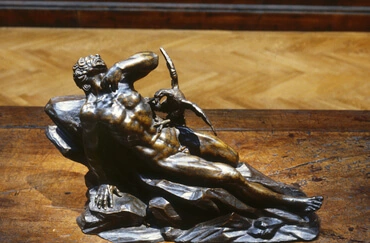79. There are many passages in the prophets about our understanding of the Word, passages about the church, where it tells us that the church exists only where the Word is properly understood, and that the quality of a church depends on the quality of the understanding of the Word among its members. There are also many passages in the prophets that describe the church among the Israelite and Jewish people, a church that was utterly destroyed and annihilated by the distortion of the Word’s meaning or message, for this is exactly what destroys a church.
[2] The name Ephraim in the prophets, especially in Hosea, symbolizes both true and false understandings of the Word, because Ephraim in the Word means the understanding of the Word in the church. It is because the understanding of the Word makes a church that Ephraim is called “a precious child, and one born of delights” (Jeremiah 31:20), “the firstborn” (Jeremiah 31:9), “the strength of Jehovah’s head” (Psalms 60:7; 108:8), “powerful” (Zechariah 10:7), and “filled with a bow” (Zechariah 9:13); and the children of Ephraim are called “armed” and “bow-shooters” (Psalms 78:9). The bow means a body of teaching from the Word fighting against what is false.
So too, Ephraim was transferred to the right of Israel and blessed, and accepted in place of Reuben (Genesis 48:5, 11, and following; [1 Chronicles 5:1]). And therefore Ephraim, together with his brother Manasseh, was exalted over all by Moses in his blessing of the children of Israel in the name of their father Joseph (Deuteronomy 33:13-17).
[3] The prophets, especially Hosea, also use “Ephraim” to describe what the church is like when its understanding of the Word has been lost, as we can see from the following:
Israel and Ephraim will stumble. Ephraim will be desolate. Ephraim is oppressed and broken in judgment. I will be like a lion to Ephraim: I will tear them and leave; I will carry them off and no one will rescue them. (Hosea 5:5, 9, 11, 14)
What shall I do to you, Ephraim? Your holiness goes away like a cloud at dawn and like the morning dew that falls. (Hosea 6:4)
[4] They will not dwell in the land of Jehovah: Ephraim will go back to Egypt and will eat what is unclean in Assyria. (Hosea 9:3)
The land of Jehovah is the church, Egypt is the preoccupation of the earthly self with mere facts, and Assyria is rationalizing based on those facts; all of which lead to distortion of the Word in regard to the way it is understood. That is why it says that Ephraim will go back to Egypt and will eat what is unclean in Assyria.
[5] Ephraim feeds on the wind and chases the east wind. Every day he increases lies and devastation. He makes a covenant with Assyria, and oil is carried down into Egypt. (Hosea 12:1)
To feed on the wind, chase the east wind, and increase lies and devastation is to distort what is true and in this way destroy the church.
[6] Much the same is also meant by Ephraim’s whoredom, since whoredom means distortion of the way the Word is understood - that is, distortion of its genuine truth. See the following passages:
I know Ephraim; he has committed whoredom in every way and Israel has been defiled. (Hosea 5:3)
I have seen something foul in the house of Israel: Ephraim has committed whoredom there, and Israel has been defiled. (Hosea 6:10)
Israel is the church itself and Ephraim is the understanding of the Word that is the source of the church and that determines its quality, so it says that Ephraim has committed whoredom and Israel has been defiled.
[7] Since the church among Jews had been completely destroyed because of its distortions, it says of Ephraim,
Am I to give you up, Ephraim? Am I to hand you over, Israel? Like Admah? Shall I make you like Zeboiim? (Hosea 11:8)
Since the book of the prophet Hosea, from the first chapter to the last, is about the distortion of the Word and the consequent destruction of the church, and since whoredom means the distortion of truth in the church, the prophet was commanded to represent that state of the church by taking a whore as his wife and fathering children by her (chapter 1); and also by forming a relationship with a woman who was committing adultery (chapter 3).
[8] These instances have been presented so that readers may know and be assured from the Word that the quality of a church depends on the quality of the understanding of the Word in it - outstanding and priceless if its understanding comes from genuine truths from the Word, but in ruins, actually filthy, if it comes from distortions.
For further evidence that Ephraim means the understanding of the Word, and in its opposite sense a distorted understanding leading to the destruction of the church, you may check some other passages that deal with Ephraim: Hosea 4:17-18; 7:1, 11; 8:9, 11; 9:11-13, 16; 10:11; 11:3; 12:1, 8, 14; 13:1, 8, 14; Isaiah 17:3; 28:1; Jeremiah 4:15; 31:6, 18; 50:19; Ezekiel 37:16; 48:5; Obadiah verse 19; Zechariah 9:10.







